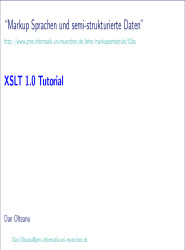XSLT Tutorial in PDF
Table of contents
- What means XSLT?
- Why Transform XML?
- Publishing XML data
- Data Conversion
- How XML data can be transformed using XSLT?
- The place of XSLT in the XML family
- Styling: XSLT vs. CSS
- Processing: XSLT vs. XML Query
- Simple Transformation Examples with XSLT
- The XSLT Processing Model
- The Supported Information Items
- The Transformation Process
- Push Processing
- Conflict Resolution Policy
- The XSLT Language
- XML syntax
- Data Types in XSLT
- XSLT variables & parameters
- XPath Expressions
- Stylesheet Structure
- XSLT Elements
- Finally an Example Break
- XSLT Design Patterns
- Fill-in-the blanks stylesheets
- Navigational stylesheets
- Rule-based stylesheets
- Computational stylesheets
- XSLT Processors: Saxon
- XSLT Processors: Xalan
- XSLT Processors: Architecture
- XSLT Processors: Comparison
What's XSLT
XML Stylesheet Language (XSL) has been designed to transform XML documents into other formats such as PDF or HTML pages. During its development, the project proved to be more complex than expected and it was split into two separate XSLT and XSL-FO units. XML Stylesheet Language Transformation (XSLT) is an XML document transformation language. XSL-FO (for XML Stylesheet Language - Formatting Objects) is a document layout language. The process of transforming an XML document into a printable document, for example in PDF format, is divided into two phases. In the first phase, the XML document is transformed into an XSL-FO document using XSLT style sheets. In the second phase, the FO document obtained in the first phase is converted by an FO processor into a printable document.
Although the XSLT language originates in the transformation of XML documents into XSL-FO documents, it is suitable for transforming a document of any XML dialect into a document of any other XML dialect. It is often used to produce XSL-FO or XHTML documents, but it can also produce SVG documents. XSLT is also often used to perform simple transformations on documents. For example, you want to delete some elements, replace an attribute with an element, or move an element.
This chapter is dedicated to the XSLT part of XSL. Like all of this book, it is essentially based on examples available at the URL http://www.liafa.univ-paris-diderot.fr/~carton/Enseignement/XML/
Principle
The working principle of XSLT is as follows. An XSLT style sheet contains rules that describe transformations. These rules are applied to an XML source document to obtain a new XML result document. This transformation is performed by a program called XSLT processor. The style sheet is also called a program because it is the instructions to be executed by the processor.
| Size : | 1921.979 Kb |
| File type : | |
| Downloads: | 229 |
| Created: | 2018-05-30 |
Warning: Trying to access array offset on false in /home/tutovnfz/public_html/article.php on line 233
Others related eBooks about XSLT Tutorial in PDF
Complete guide to Adobe PhotoshopWith this pdf tutorial you will be able to create your own project in Photoshop .You will learn all the basics and create a project from scratch. Free training courses designated for student....
Building the Infrastructure for Cloud SecurityFor cloud users and providers alike, security is an everyday concern, yet there are very f..., download free Cloud Security tutorial in PDF (244 pages) created by Raghuram Yeluri ....
Embedded Firmware SolutionsDownload free course Embedded Firmware Solutions, pdf file on 215 pages by Jiming Sun, Marc Jones, Stefan Reinauer, Vincent Zimmer....
iOS Notes for ProfessionalsDo you want to understand all the facets of iOS programming and build complex iOS apps? Then you have come to the right place. This problem-solution guide will help you to eliminate expensive learning curves and focus on specific issues to make you proficient at tasks and the speed-up time involved....
Mobile Developer's Guide To The GalaxyThis book is a community publication about all things mobile, aims to spread knowledge about mobile technologies and encourage people to enter mobile community or deepen their existing knowledge....
The Nature of CodeDownload free course The Nature of Code, pdf file on 519 pages by Daniel Shiffman....
Crypto 101Crypto 101 is an introductory course on cryptography, freely available for programmers of ..., download free Cryptography tutorial in PDF (254 pages) created by Laurens Van Houtven ....
Cloud Native ApplicationsDownload free course Cloud Native Applications, pdf file on 120 pages by Michael Wittig, Andreas Wittig....
Engineering Reliable Mobile ApplicationsDownload free course Engineering Reliable Mobile Applications, pdf file on 36 pages by Kristine Chen, Venkat Patnala, Devin Carraway, Pranjal Deo....
Black book for virus and hackingDownload free ebook under creative common license about virus and hacking created by Marc ludwig....
